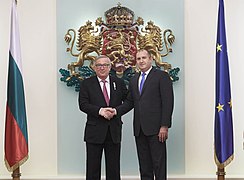2018 Bulgarian Presidency of the Council of the European Union
Bulgaria held the presidency of the Council of the European Union during the first half of 2018.[1][2] The presidency was the second of three presidencies making up a presidency trio, which began with the presidency of Estonia, and was followed by that of Austria.[3] It was the first time Bulgaria had held the presidency.[4] The motto that was chosen for the presidency was "United we stand strong".[1][4]
Overview
The Bulgarian presidency had four major points on its agenda: (1) closing socioeconomic gaps, (2) planning for integration with states of the Western Balkans, (3) providing security and stability, and (4) adapting the economy in response to digital advances.[5] The presidency also had to face issues pertaining to the United Kingdom's exit from the European Union (Brexit), the continuing influx of refugees and migrants, and the planning for a new multiyear budget for the union.[6][7]
Vladislava Gubalova, a research fellow at the GLOBSEC Policy Institute, described the presidency as "more about style than substance".[8] Gubalova stated that although the presidency did not make any major missteps, the progress that it made would likely not be seen as historic.[8] Overall, Gubalova considered the presidency satisfactory, and reported that it showed that Bulgaria was able to competently handle the competing interests of the European Union.[8]
Gallery
-
![Bulgarian prime minister Boyko Borisov at the opening ceremony of the Bulgarian presidency, at Sofia's National Palace of Culture, 11 January 2018[9]](//upload.wikimedia.org/wikipedia/commons/thumb/f/ff/Opening_ceremony_%2838929654524%29.jpg/262px-Opening_ceremony_%2838929654524%29.jpg) Bulgarian prime minister Boyko Borisov at the opening ceremony of the Bulgarian presidency, at Sofia's National Palace of Culture, 11 January 2018[9]
Bulgarian prime minister Boyko Borisov at the opening ceremony of the Bulgarian presidency, at Sofia's National Palace of Culture, 11 January 2018[9] -
 Bulgarian Prime Minister Boyko Borisov with President of the European Council Donald Tusk in Sofia, 11 January 2018
Bulgarian Prime Minister Boyko Borisov with President of the European Council Donald Tusk in Sofia, 11 January 2018 -
 Bulgarian President Rumen Radev with President of the European Commission Jean-Claude Juncker in Sofia, 12 January 2018
Bulgarian President Rumen Radev with President of the European Commission Jean-Claude Juncker in Sofia, 12 January 2018
References
- ^ a b List of presidencies of the Council of the European Union consilium.europa.eu
- ^ Who’s who in the Bulgarian EU presidency Politico
- ^ Estonia, Bulgaria and Austria ‘presidency trio’ outlines priorities EURACTIV
- ^ a b Priorities of the Bulgarian EU Council Presidency euromil.org
- ^ Bulgaria assumes Presidency of the Council of the EU bundesregierung.de via Archive Today
- ^ Turbulent times in Europe for Bulgaria Deutsche Welle
- ^ Bulgaria FM: ‘Not only Bulgaria doesn't want refugees’ Deutsche Welle
- ^ a b c The Bulgarian Presidency: more about style than substance EURACTIV
- ^ Today at Commission: Sofia trip and electric pulse fishing Politico
External links

- Official website
- v
- t
- e
- 2005: Luxembourg – United Kingdom
- 2006: Austria – Finland
- 2007: Germany – Portugal
- 2008: Slovenia – France
- 2009: Czech Republic – Sweden
- 2010: Spain – Belgium
- 2011: Hungary – Poland
- 2012: Denmark – Cyprus
- 2013: Ireland – Lithuania
- 2014: Greece – Italy
- 2015: Latvia – Luxembourg
- 2016: Netherlands – Slovakia
- 2017: Malta – Estonia
- 2018: Bulgaria – Austria
- 2019: Romania – Finland
- 2020: Croatia – Germany
- 2021: Portugal – Slovenia
- 2022: France – Czech Republic
- 2023: Sweden – Spain
- 2024: Belgium – Hungary
- 2025: Poland – Denmark
- 2026: Cyprus – Ireland
![Bulgarian prime minister Boyko Borisov at the opening ceremony of the Bulgarian presidency, at Sofia's National Palace of Culture, 11 January 2018[9]](http://upload.wikimedia.org/wikipedia/commons/thumb/f/ff/Opening_ceremony_%2838929654524%29.jpg/262px-Opening_ceremony_%2838929654524%29.jpg)














